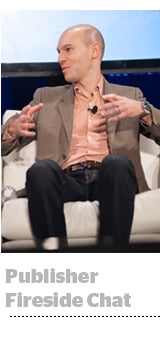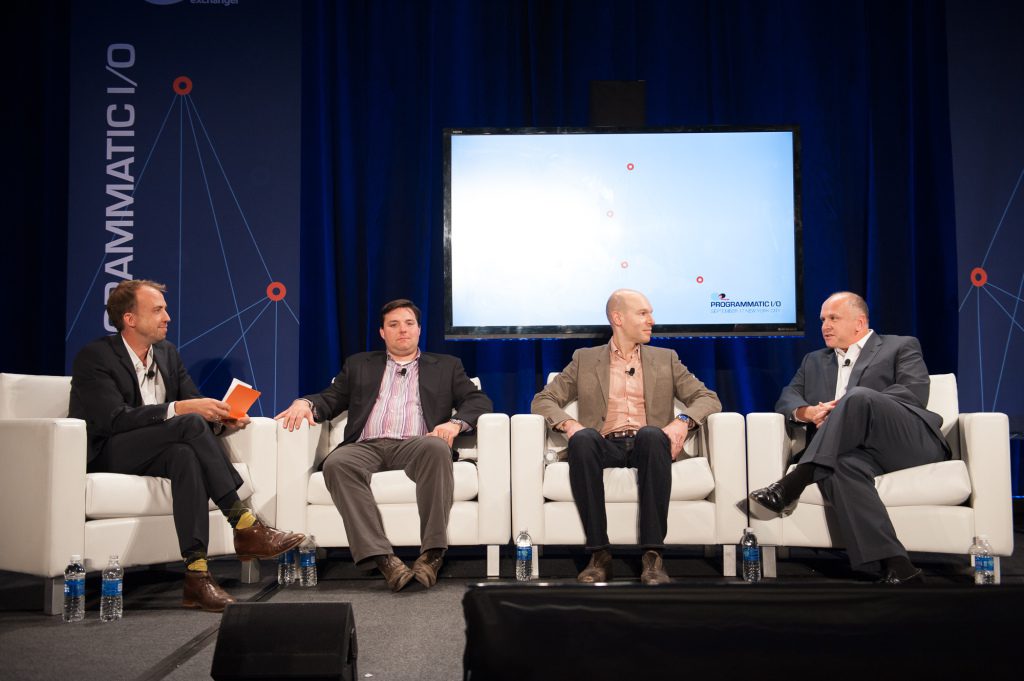 Do open auctions have a future? It depends which publisher you ask. According to executives from Meredith, Yahoo and AOL, who spoke at the Programmatic I/O Conference on Wednesday, change is coming.
Do open auctions have a future? It depends which publisher you ask. According to executives from Meredith, Yahoo and AOL, who spoke at the Programmatic I/O Conference on Wednesday, change is coming.
“It won’t live on” in its current form, said Meredith’s VP of programmatic sales and strategy, Chip Schenck. “Because it’s used and thought of as a remnant marketplace. There will be the choice for sellers to not play there because their yield is better in other places,” such as private marketplaces.
But even then, he said, “Private marketplaces are just a stop on the way to something else.”
“More inventory is going private,” said Yahoo’s Dennis Buchheim, VP of programmatic product management. “Initially, it started out a way for publishers to make that inventory available and for advertisers to be comfortable buying RTB. My question is, there is always a backbone of marketplace – what comes next to private marketplace is interesting, because it’s only scalable to a point.”
AOL Platforms CTO Seth Demsey said open auctions are here to stay. “Yes. I see continued life for the open exchange environment. It comes down to monetization strategy, which is multitiered, multifaceted, with different layers of cake. There’s constant tweaking and tuning.”
Just what that tweaking and tuning will be was subject to a debate that continued in the green room after the on-stage chat.
“Demand-side decisioning, the ability for that side to pick and choose, drives programmatic,” Schenck said. “If biddable is growing, or if it plateaus, the question is what happens with different forms of programmatic that are not biddable.”
But change will likely happen whether or not biddable programmatic grows or plateaus.
“Our view is the auction hasn’t peaked,” Buchheim said. “The layers on top of the auction, and the rules of the auction, are evolving really rapidly. It was stable for a while, at the beginning when it was all shiny and new. Now you’re seeing private marketplaces, and other new practices.”
The rise of private marketplaces, which bring back one-to-one relationships and many of the inefficiencies biddable programmatic eliminated, raises interesting questions about the evolution of the space.
“Look, if everyone turns to private marketplace relationships, you’re almost back to the beginning,” Buchheim said, adding that he doesn’t think that’s likely to happen. But programmatic could become further complex, adopting more transactions that come from financial markets, or even creating a futures market.
Publishers On Reach Extension
The practice of reach extension, where a publisher sells impressions offsite for an advertiser, often by leveraging its data, represents a still-growing opportunity for publishers.
“The idea of a publisher being a beneficiary of the rich tooling created for the buy side is something publishers are looking at, and an interesting twist,” Demsey said. “When inventory is sold out, prices go up, and you can extend those audiences programmatically. Reach extension is a low-friction way to do that.”
Schenck cautioned that if done by disreputable publishers, the tactic can lead to fraud. “The question of who’s doing the extension is a big deal. For us, we’re looking at things like viewability, and using all the vendors we use on our own site, because we want it to be of beneficial quality.”
As more publishers build and leverage their own data-management platforms, audience extension will grow. “Audience extension today has not had quality of data sets. Tomorrow it will be significantly different,” Schenck said. “One part is the development of first-party data sets, the other part of it is that publishers of quality will find and flock to audiences and inventory of quality.”
Publishers On ‘Native Programmatic’
Publishers interested in native content or exchanges right now have plenty of options – but Schenck doesn’t see that as a good thing. “Right now there are nine platforms that all talk about programmatic native. I don’t want to jump into something where there are nine platforms claiming a standard. That means there is no standard.”
Unquestionably, though, native will be transacted programmatically. “I’ve always talked about programmatic as a protocol,” Schenck said. “You can put it up against anything, as long as there is a protocol on both sides.
AOL is staking a claim in native in part through its acquisition of Gravity, which has a content recommendation engine as well as personalization tools that “can surface highly relevant native ads. … I do believe that native programmatic is part of the future,” Demsey said.
“We’re in the process of figuring out how to get there,” he said, citing The Huffington Post as an example of early success among both readers and advertisers.
Yahoo is already taking steps to manage native and display content side by side.
“We are using Ad Manager Plus internally to unify across platforms, channels and forms,” Buchheim said. “The launch of Yahoo Gemini made it more complex to mange inventory holistically across properties, and it’s going to get more complex, which in many ways is the reason we built Ad Manager Plus.”














